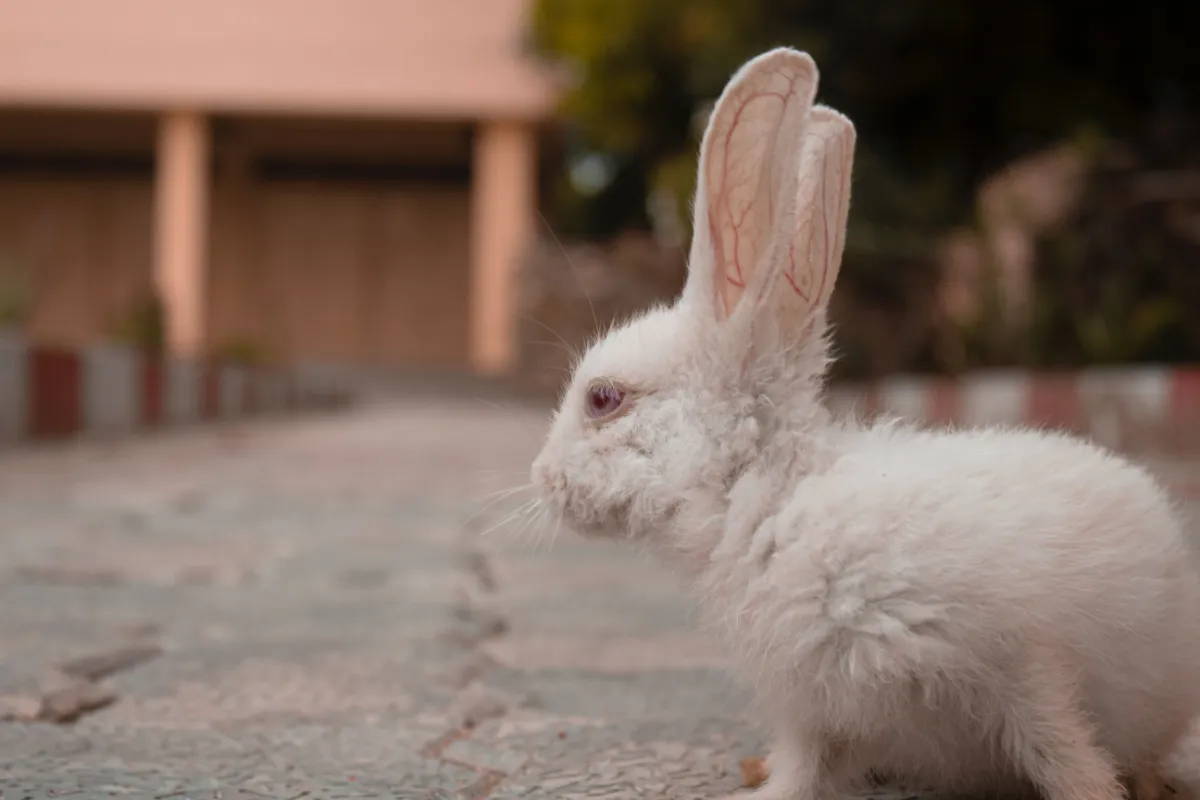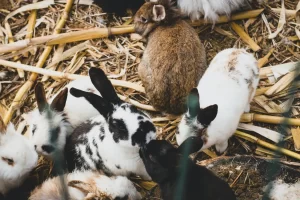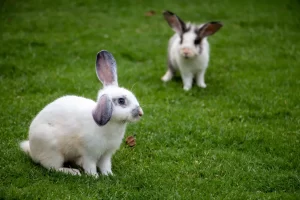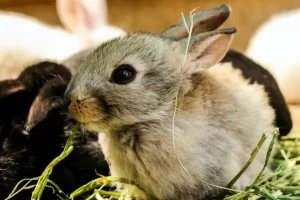Are you worried about your constipated rabbit’s discomfort? Don’t fret! In this informative article, we will guide you on how to treat your furry friend’s constipation effectively.
By understanding the unique digestion of rabbits and identifying the signs of constipation, you will be better equipped to adjust their diet, increase fiber intake, and encourage hydration.
We will also provide tips for gentle exercise and when to seek veterinary assistance.
Get ready to help your beloved rabbit find relief and well-being.
In This Article
- 1 Key Takeaways
- 2 Understanding Rabbit Digestion
- 3 Identifying the Signs of Constipation
- 4 Adjusting Your Rabbit’s Diet
- 5 Increasing Fiber Intake
- 6 Encouraging Hydration
- 7 Providing Gentle Exercise
- 8 Seeking Veterinary Assistance
- 9 Frequently Asked Questions
- 9.1 Can I Use Over-The-Counter Laxatives for My Constipated Rabbit?
- 9.2 How Long Does It Usually Take for a Rabbit’s Digestion to Return to Normal After Treating Constipation?
- 9.3 Are There Any Specific Fruits or Vegetables That Can Help Relieve Constipation in Rabbits?
- 9.4 Can Stress or Anxiety Contribute to Constipation in Rabbits?
- 9.5 Is It Normal for Rabbits to Have Occasional Bouts of Constipation, or Should I Be Concerned if It Happens Frequently?
- 10 Conclusion
Key Takeaways
- Adjusting the rabbit’s diet by providing a high-fiber diet rich in hay and fresh vegetables
- Ensuring the rabbit stays hydrated by providing access to fresh water and incorporating hydrating foods into their diet
- Encouraging gentle exercise through playtime, hopping around, and light stretching
- Seeking veterinary assistance if constipation persists or worsens for proper examination and treatment
Understanding Rabbit Digestion
Do you know how long it takes for a rabbit’s food to pass through its digestive system?
Understanding the rabbit’s digestive system is crucial in preventing and treating constipation in these furry little creatures.
A rabbit’s digestive system is designed to efficiently process a high-fiber diet, and their food typically takes around 4-6 hours to pass through their digestive tract. However, certain factors can disrupt this process and lead to constipation.
Common causes of rabbit constipation include a lack of fiber in their diet, dehydration, stress, and dental issues.
It’s important to provide rabbits with a diet rich in hay, fresh vegetables, and limited amounts of pellets to ensure proper digestion. Additionally, ensuring that rabbits have access to fresh water at all times and minimizing stressors in their environment can help maintain a healthy digestive system.
Identifying the Signs of Constipation
If you notice your rabbit straining to defecate or producing small, dry stools, it may be a sign of constipation. Recognizing these symptoms early on is essential for ensuring the well-being of your furry friend.
Constipation can be uncomfortable and even painful for rabbits, so it’s crucial to take preventive measures to avoid this condition. Here are a few tips to help you recognize the symptoms and prevent constipation:
- Ensure your rabbit has a balanced diet rich in fiber.
- Provide plenty of fresh water to keep your rabbit hydrated.
- Encourage exercise through regular playtime and hopping around.
By following these guidelines, you can promote a healthy digestive system in your rabbit and prevent constipation.
Adjusting Your Rabbit’s Diet
To improve your rabbit’s digestion, consider adding more leafy greens and hay to their diet, and make sure to avoid feeding them sugary treats or human food. Dietary changes can play a significant role in preventing constipation and promoting a healthy digestive system for your furry friend.
Rabbits are herbivores and rely on a high-fiber diet to maintain proper digestion. Leafy greens such as romaine lettuce, kale, and spinach are excellent sources of fiber. Additionally, feeding your rabbit an ample amount of hay is crucial as it aids in keeping their gut moving and prevents the formation of hairballs.
Avoiding sugary treats and human food is essential as they can disrupt your rabbit’s digestive system and lead to constipation. By making these dietary adjustments, you can naturally support your rabbit’s digestion and prevent constipation.
Increasing Fiber Intake
By incorporating more fiber-rich foods into your diet, such as whole grains and legumes, and by regularly consuming fruits and vegetables, you can easily increase your fiber intake and improve your overall digestive health. Fiber is essential for maintaining a healthy digestive system as it adds bulk to your stool and helps move it through your intestines more efficiently.
Here are three important reasons why you should prioritize fiber-rich foods in your diet:
- Fiber prevents constipation: It adds bulk to your stool, making it easier to pass and reducing the likelihood of constipation.
- Fiber aids in weight management: High-fiber foods are often lower in calories and keep you feeling full for longer, helping to control your weight.
- Fiber promotes a healthy gut: It nourishes the beneficial bacteria in your gut, improving digestion and reducing the risk of digestive disorders.
Make sure to include a variety of fiber-rich foods in your meals, such as whole grains, legumes, fruits, and vegetables, to support your digestive health.
Encouraging Hydration
You should definitely make an effort to drink plenty of water throughout the day, as it’s incredibly important for maintaining proper hydration and overall health.
Preventing dehydration is crucial, as it can lead to fatigue, dizziness, and even more serious health issues. Managing water intake is essential for maintaining a healthy balance in the body.
It’s recommended to drink at least 8 cups of water per day, but individual needs may vary depending on factors such as activity level and climate.
To ensure you’re staying properly hydrated, carry a water bottle with you and sip on it throughout the day. You can also incorporate hydrating foods into your diet, such as fruits and vegetables with high water content.
Providing Gentle Exercise
Make sure to incorporate some light stretching and walking into your daily routine to provide gentle exercise for your body. Physical activity is essential for maintaining a healthy lifestyle and promoting overall well-being.
When it comes to exercise, it’s important to choose activities that are appropriate for your body and preferences. Here are some ideas to get you started:
- Take a leisurely stroll in the park: Enjoy the fresh air and nature while getting some exercise.
- Engage in outdoor sports: Whether it’s playing catch, kicking a soccer ball, or shooting hoops, outdoor playtime can be both fun and physically beneficial.
- Use appropriate toys for physical activity: Consider using resistance bands, yoga mats, or even a jump rope to add variety to your exercise routine.
Seeking Veterinary Assistance
If your rabbit is showing signs of discomfort or illness, it’s crucial to regularly seek veterinary assistance to ensure their health and well-being. As a responsible rabbit owner, you should be aware of certain vet recommendations and know when it’s time to see a vet.
Some common signs that your rabbit may need medical attention include a loss of appetite, changes in behavior, difficulty breathing, diarrhea, or discharge from the eyes or nose. It’s important not to delay seeking veterinary assistance, as rabbits can deteriorate quickly when they’re unwell. Additionally, rabbits are experts at hiding their pain, so it’s better to err on the side of caution and seek professional advice.
Regular check-ups with a rabbit-savvy vet can also help detect and prevent potential health issues, ensuring your furry friend stays happy and healthy.
Frequently Asked Questions
Can I Use Over-The-Counter Laxatives for My Constipated Rabbit?
You can use over-the-counter laxatives for your constipated rabbit, but there are alternative treatments you should consider. It’s important to consult a veterinarian to ensure the best course of action for your furry friend.
How Long Does It Usually Take for a Rabbit’s Digestion to Return to Normal After Treating Constipation?
After treating constipation in a rabbit, it usually takes a few days for their digestion to return to normal. It’s important to monitor their eating and bathroom habits during this time to ensure they fully recover.
Are There Any Specific Fruits or Vegetables That Can Help Relieve Constipation in Rabbits?
To relieve constipation in rabbits, specific fruits like papaya and vegetables like leafy greens can be beneficial. These natural remedies act like gentle, magical cleaners for your rabbit’s digestive system, promoting regularity and comfort.
Can Stress or Anxiety Contribute to Constipation in Rabbits?
Stress and anxiety can indeed contribute to constipation in rabbits. It’s important to prioritize stress management and identify any behavioral changes that may be causing your rabbit distress.
Is It Normal for Rabbits to Have Occasional Bouts of Constipation, or Should I Be Concerned if It Happens Frequently?
Frequent constipation in rabbits can be a cause for concern. It’s not normal for rabbits to have frequent bouts of constipation. Common causes include diet and lack of exercise. Long term effects can negatively impact their health and well-being.
Conclusion
In conclusion, treating a constipated rabbit requires a combination of dietary adjustments, increased fiber intake, hydration encouragement, gentle exercise, and, if necessary, veterinary assistance.
Remember, rabbits have delicate digestive systems, so it’s important to be knowledgeable and informed about their specific needs.
By following these steps and providing the necessary care, you can help your constipated rabbit find relief and maintain a healthy digestive system.
As they say, ‘A well-nourished rabbit is as happy as a hare in the field.’





